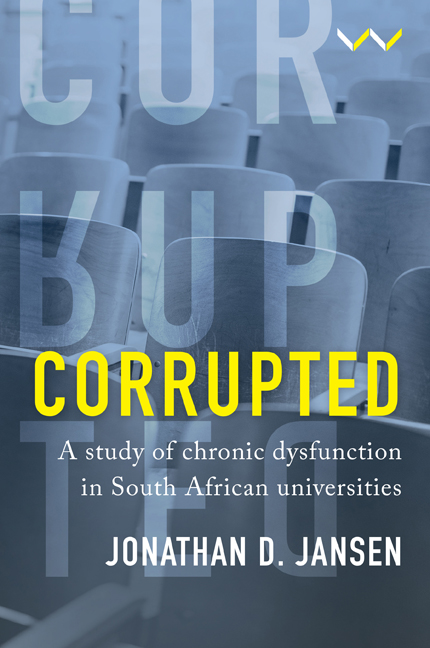Book contents
- Frontmatter
- Contents
- Acknowledgements
- Acronyms and Abbreviations
- Map: South African Universities
- Chapter 1 A Study of Chronic Dysfunction in Universities
- Chapter 2 Historical Roots of Dysfunction: Shaping the South African University
- Chapter 3 Dysfunctionality in Universities: A Political Economy Perspective
- Chapter 4 A Personal Journey Through the Political Economy of Universities
- Chapter 5 Casting Long Shadows: How History Shapes the Politics of Universities In South Africa
- Chapter 6 The University as a Concentrated and Exploitable Resource
- Chapter 7 The University as a Criminal Enterprise
- Chapter 8 The Micropolitics of Corruption in Universities
- Chapter 9 The Twin Roots of Chronic Dysfunctionality in Universities
- Chapter 10 Rethinking and Rebuilding Dysfunctional South African Universities
- Appendices
- Notes
- References
- Index
Chapter 5 - Casting Long Shadows: How History Shapes the Politics of Universities In South Africa
Published online by Cambridge University Press: 29 November 2023
- Frontmatter
- Contents
- Acknowledgements
- Acronyms and Abbreviations
- Map: South African Universities
- Chapter 1 A Study of Chronic Dysfunction in Universities
- Chapter 2 Historical Roots of Dysfunction: Shaping the South African University
- Chapter 3 Dysfunctionality in Universities: A Political Economy Perspective
- Chapter 4 A Personal Journey Through the Political Economy of Universities
- Chapter 5 Casting Long Shadows: How History Shapes the Politics of Universities In South Africa
- Chapter 6 The University as a Concentrated and Exploitable Resource
- Chapter 7 The University as a Criminal Enterprise
- Chapter 8 The Micropolitics of Corruption in Universities
- Chapter 9 The Twin Roots of Chronic Dysfunctionality in Universities
- Chapter 10 Rethinking and Rebuilding Dysfunctional South African Universities
- Appendices
- Notes
- References
- Index
Summary
By any measure of social change, the end of apartheid appeared suddenly, even if, in the longue durée of southern African politics, it was inevitable. Given P. W. Botha's calamitous Rubicon speech of August 1985, which some had expected to move the country towards the end of racial rule, political observers had grounds to be cautious when the so-called reformer F. W. de Klerk replaced the Old Crocodile. For this reason, the announcement in February 1990 of the unbanning of black political parties and the release of Nelson Mandela and other prominent prisoners caught most citizens off guard.
In the middle of an ongoing anti-apartheid struggle, the announcement meant that new strategies and tactics had to be adopted by the liberation movements outside the country, and by the democratic opposition on the inside, even as negotiating parties started working on the terms of the transition to democracy. How do you resist even as you cooperate? How do you reconcile and repair in the face of a low-intensity civil war, from the streets of Johannesburg to the lush green fields of the Natal Midlands? And how do you build democratic education institutions while the old structures are still in place?
In this period of high uncertainty about South Africa's political future, much conciliatory symbolism was offered for the public mind: from the fish hook caught in the hand of one of the negotiators and taken out by the other,1 to the imagery of a rainbow nation touted by the popular cleric Desmond Tutu, and the symbolic act of Nelson Mandela donning the jersey of the white Springbok captain during the rugby World Cup of 1995. Antonio Gramsci's notion of interregnum was no longer a theoretical construct invoked by the more intellectual comrades, but the lived experience of leaders and institutions struggling to make sense of the old that was dying and of the new not yet born. The former liberation movement and soon-to-be ruling party felt compelled to put out an unbidden pamphlet intended to reassure, called Ready to Govern!
As elsewhere in the society, this anxious transition was made with great difficulty in South Africa's public universities.
- Type
- Chapter
- Information
- CorruptedA Study of Chronic Dysfunction in South African Universities, pp. 89 - 114Publisher: Wits University PressPrint publication year: 2023



